Month of the Military Child: An Exceptional Family
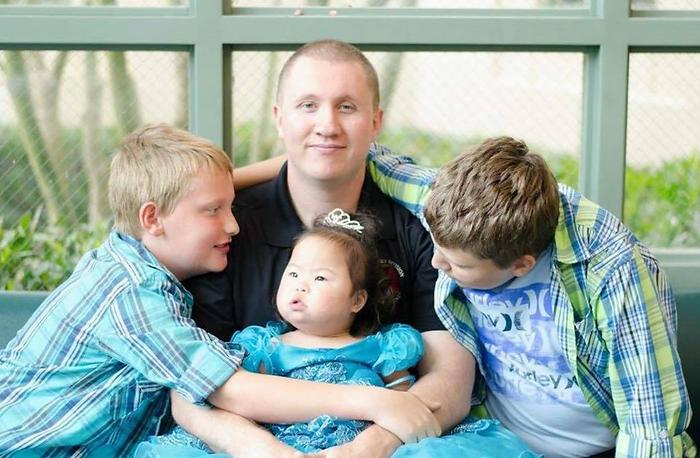
April is Month of the Military Child, a celebration of the courage, perseverance, and tenacity demonstrated by military-connected children, youth, and teens. Melanie Carrigg is one of the more than 1.6 million military children in the nation who face unique challenges and experiences as a result of their parents’ service. This is her story.
When Austin Carrigg and her husband Joshua, a 20-year active duty service member in the Army, decided to adopt a baby, they knew in advance that she would have special needs. With two older sons at home, they were ready to complete their family and welcome a daughter – and when Melanie finally came home, that dream became a reality.
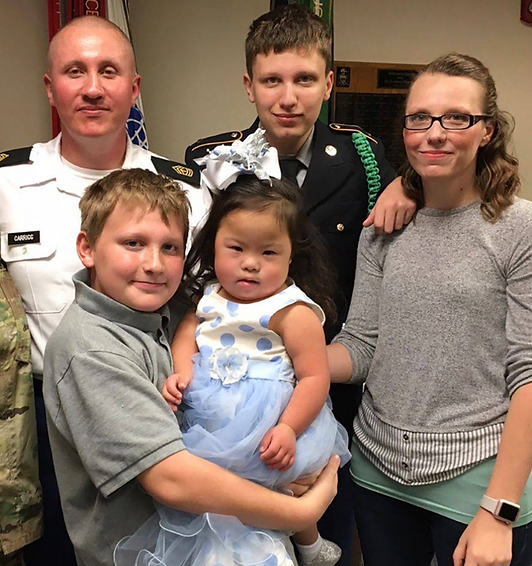
Melanie was born with Down syndrome and is deaf, but her family was prepared to provide the special care she needed and were thrilled to have their daughter.
What they couldn’t have prepared for were the other diagnoses still to come that would push them to their limits.
Shortly after Melanie was born, Austin and Joshua grew concerned that she was not developing normally. Melanie slept all day, could not hold her head up, and could not sit or walk.
Her parents couldn’t shake the feeling that there was more to her diagnosis than Down syndrome. They pleaded with a developmental pediatrician for an explanation behind Melanie’s symptoms, but the doctor dismissively told them, “She’s never going to walk and never going to talk. I never need to see you again.”
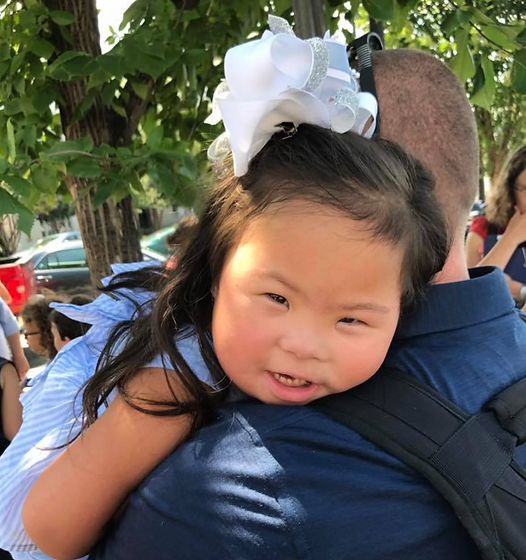
They were stunned. And it would take the unthinkable to change the doctors’ minds.
During a visit with family in Arizona, Melanie suffered a medical emergency, drifting into a coma due to dangerously low blood sugar levels. After additional testing and Austin’s relentless advocacy, a metabolic geneticist finally diagnosed Melanie with Ketocic Hypoglycemia.
Although this news shocked the family, they were incredibly relieved to finally have a name and a plan. The key to keeping her healthy? Cornstarch. “Believe it or not, that simple thing, cornstarch, maintains blood sugar,” Austin told us.
Adding cornstarch to her diet was so effective that Melanie could walk by age 3 when less than a year earlier, she couldn’t hold her head up. She was more alert and even able to speak a few words.
Unfortunately, the success of the treatment was short-lived, and Melanie began forgetting the spoken words she had learned and was having difficulty walking. Then came the seizures.
Doctors couldn’t understand what was going on or why Melanie was regressing, and all were unsuccessful in determining the cause of her seizures. An MRI would have given them the answer, but Melanie had cochlear implants, which created a safety concern for the test.
Austin kept pushing, kept pleading for the medical team to move forward with an MRI, but to no avail.
Due to the difficulties associated with the COVID-19 pandemic and waitlists for medical providers, Melanie was not able to get an MRI done for another six months after her seizures began.
By the time an MRI was finally ordered, the results revealed a devastating outcome.
Melanie had moyamoya disease, a rare, progressive disorder caused by blocked arteries at the base of the brain in an area called the basal ganglia. For those six long months waiting for medical appointments and an MRI, Melanie’s health was deteriorating. Had it been caught sooner, things might have turned out differently.
But her family couldn’t think of the what-ifs. Only the what-nows.
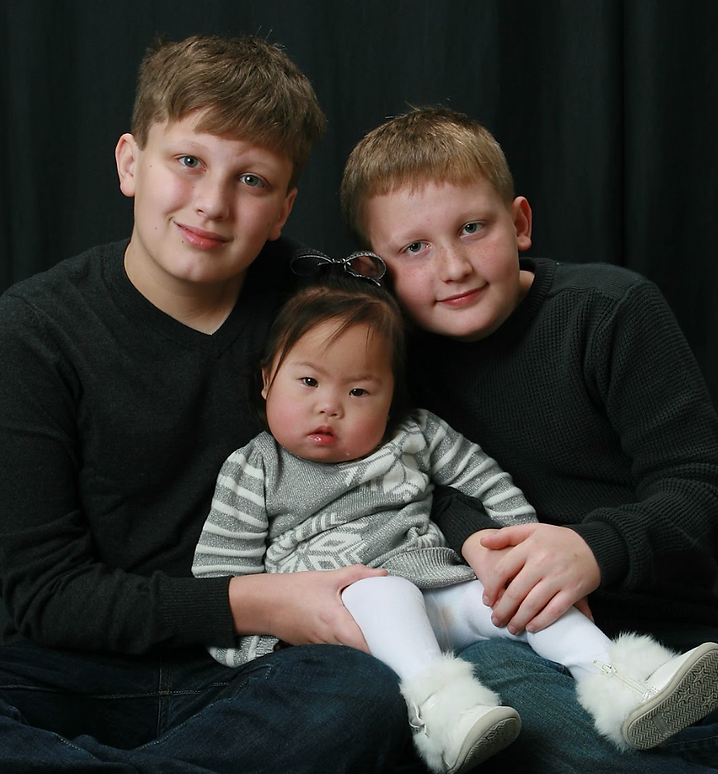
Melanie’s moyamoya disease was so advanced that she was considered stage 5/6 on a 6-point scale. Just days after her diagnosis, she suffered a catastrophic stroke that left her entire right side paralyzed. She lost the ability to communicate in American Sign Language (ASL), couldn’t swallow, and couldn’t hold her head up.
The neurosurgeon told Melanie’s parents that their daughter needed emergent brain surgery. While this procedure was potentially life-threatening, it was her only chance of survival. The hospital told Melanie’s family that they would notify them if Melanie didn’t make it so that the family could say their goodbyes.
“When the decision was made to perform surgery to restore blood flow to her brain, I was told that if she were dying on the operating room table, they’d let me come say goodbye,” explained Melanie’s brother, Christian.
“She survived that surgery just like she has overcome every obstacle that has been thrown before her – with grit, sheer will, and determination,” he continued. “She is the embodiment of every resilient military child out there.”
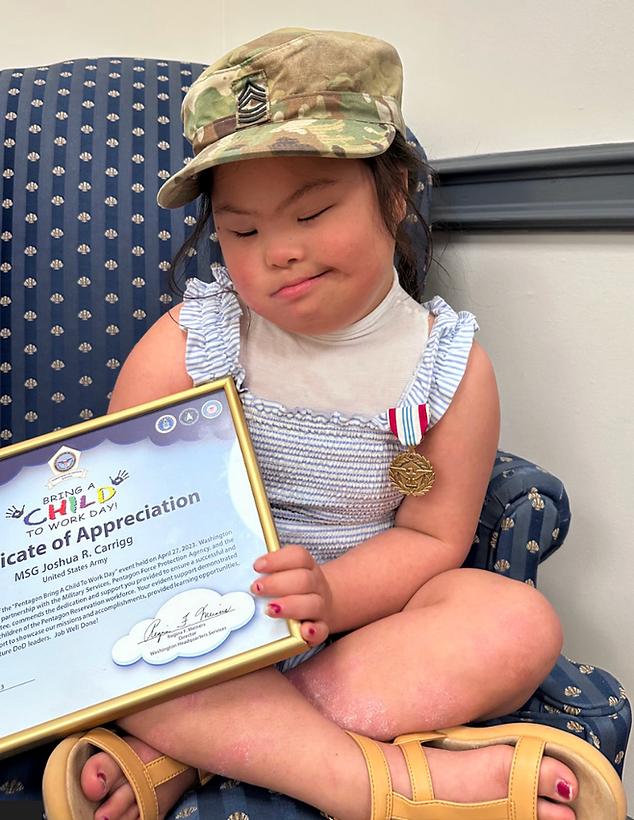
Christian later left college at Louisana State University (LSU) to spend what time she had left together as a family, telling his parents, “I want her days to be filled with memories of her big brother taking her to the pool, the park, the beach, and any other place her heart desires.”
(In 2022, Christian was honored as the Youth Caregiver of the Year for his dedication to the love and care of his sister.)
As she recovered in the hospital from the 15-hour surgery, Melanie began exhibiting symptoms of medical trauma, and she was later diagnosed with medical post-traumatic stress – a stark reminder of all she had endured.
The Carrigg family was pushed to the brink. Instead of backing down or curling into a ball (which, on some days, she wished she had), Austin jumped into action.
“I just thought, ‘If we’re going to lose her, it’s going to be for something,’” Austin said.
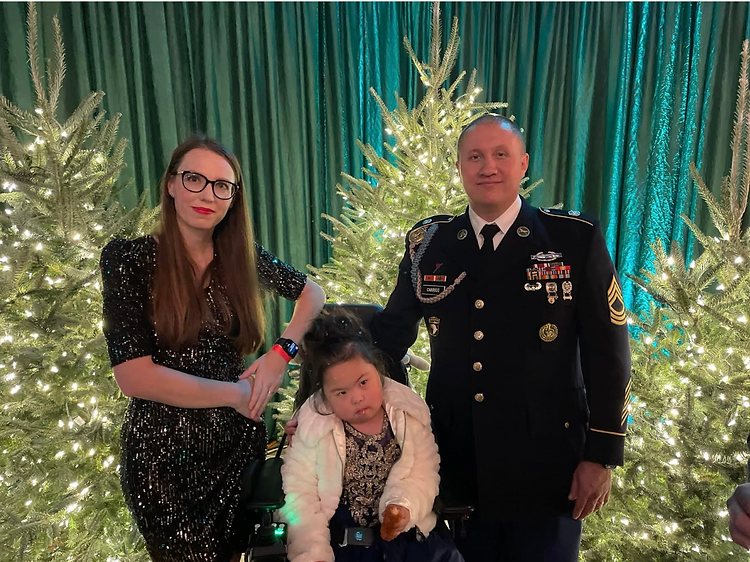
She decided to help other military families like hers who had a loved one with special needs but who were falling through the cracks or impacted by loopholes in the Army’s Exceptional Family Member Program (EFMP) – just as their family had been.
The EFMP is a mandatory enrollment program for soldiers on active duty who have a family member with a physical, emotional, developmental, or intellectual disorder that requires specialized services.
The Army’s objective is to ensure needs can be considered in the military personnel assignment process. As written, the overall goal of EFMP is “to help families accompany the service member to the right duty locations, not to exclude them.”
But sometimes, those good intentions fall short.
Austin, along with other advocates just like her, have testified before Congress about family issues ranging from difficulty in getting their health care providers and support system in place after a permanent change of station move; being transferred to locations without adequate medical and educational resources to meet their needs; and perceptions surrounding EFMP and whether it could negatively impact a service member’s career.
The EFMP’s effectiveness often hinges on the seamless coordination between military institutions and local communities. Unfortunately, gaps persist, leaving families vulnerable during transitions between duty stations.
Melanie’s parents, like many others, navigate a maze of paperwork, appointments, and advocacy while balancing the demands of military life. Each deployment, each relocation, comes with a mix of pride and apprehension, knowing that their child’s well-being hangs in the delicate balance of access to specialized care and support systems.
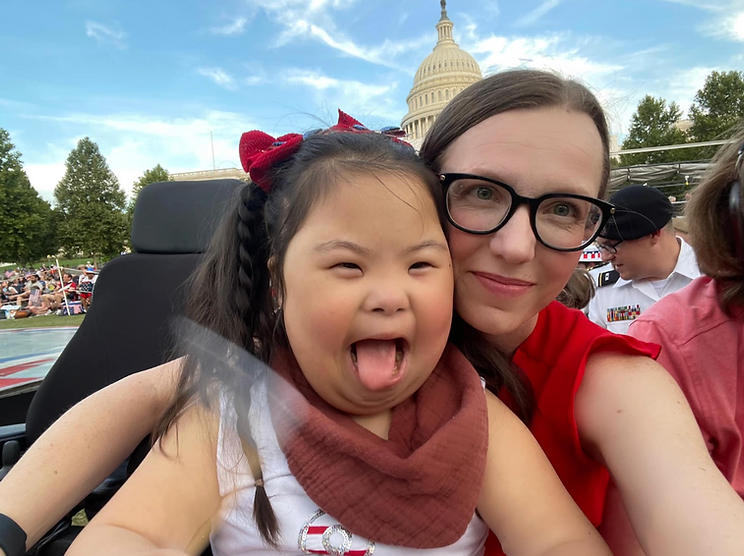
During Melanie’s hospital stay and surgery recovery, she was flown from the family’s duty station in Los Angeles to doctors in Boston with experience treating Down syndrome and moyamoya. Austin and Joshua asked the Army to expedite a request to move them closer to Boston but were met with red tape.
Working through their chain of command and the congressional inquiry process, the Carriggs caught the attention of Sgt. Maj. of the Army Michael Grinston, whose intervention became a lifeline. Through his advocacy, the family was reassigned to Washington, D.C., which brought them closer to the support they desperately needed for their daughter.
It was serendipitous in many ways.
The Carrigg family’s determination to turn their experience into advocacy and support for other military families led to the creation of their own nonprofit organization, Exceptional Families of the Military. Austin’s relentless efforts aim to bridge the gap and ensure no military family feels alone in their struggle.
“My hope is that this is Melanie’s legacy,” she told us.

Melanie is 10 years old now and has faced more than most of us could imagine. She has more spunk and determination than most of us, too.
She loves to swim and would be outside all day, every day if she could. She’s also a really good cook – “real cooking, not play cooking,” Austin laughed – and records hours of videos daily, just walking around the house or filming whatever she sees.
She is, in a word, exceptional.
It has been an unpredictable and emotional journey, but Melanie’s resilience is a testament to her spirit and the unwavering support of her family. Her story embodies hope, courage, and the enduring bond of military families facing extraordinary circumstances.
Through the EFMP and related organizations like Exceptional Families of the Military, we can better support children like Melanie. Her story has increased awareness within the broader community and transformed hurdles into stepping stones of support.
It also serves as a poignant reminder of the ongoing journey toward creating a more inclusive and supportive environment for exceptional military families – a journey that requires not just policy changes but a collective embrace of empathy and understanding. Our military families, and especially our military children, deserve it.
Like Melanie has taught us, no matter what, it’s going to be for something.

At Mission Roll Call, one of our top priorities is advocating for veterans and their families, like Melanie’s, to get the healthcare and benefits they deserve. Her story is one of many and an example of why it’s important to share your voice to help enact change. Become a Mission Roll Call member and have the opportunity to participate in polls, identify the issues and topics most important to you, and empower us to speak on your behalf straight to government leaders.
Do you have a story or perspective you’d like to share? We want to hear from you. Submit your story and let your voice be heard.